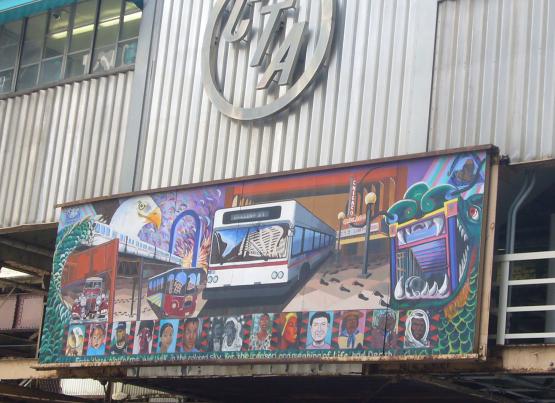
Right on the streets of every American community, robbery takes place every working day. You might not realize how much value the people of Chicago (and every other community) create, simply by going about our daily activities. What is this wealth, how do we create it, and where does it go?
Originally conceived as a field trip for Progress & Poverty students, this stroll — about 2 km and 90 minutes — presents some answers for those interested in finding out. Additionally, we’ll take a look at recovered loot of a long-ago theft, learn how Thomas Jefferson would have solved the problem of financing Chicago’s public schools, and see an economic development incentive that costs less than nothing. We might stop for snacks along the way (individual settlement).
Detailed sourced notes will be provided. This is now a free tour, no donation required, although we do appreciate (tax-deductible) contributions from those who can afford it and find the event worthwhile.

This presentation has been cancelled. We will let you know when it’s been rescheduled. There will be no presentation February 21, 2019.
The Battle of Lincoln Park tells the story of how people with clashing visions and values fought to determine the path gentrification would take before anyone was using that word. Calling on the power of private funds, public policy, moral appeals, and both nonviolent and violent protest, residents of Old Town and Lincoln Park struggled over the meaning of “desirable” homes, “neighborhood character”, and what kind of city Chicago should be. The outcomes set the tone for profound changes to the city that are still unfolding today.
Acclaimed author Daniel Kay Hertz has written extensively on subjects relating to gentrification, housing, urban demographics, and transportation. This is his first book.
Registration is required for this free event. Building security will print a badge for you to go upstairs. If you plan to come, or are just considering the possibility, please let us know by email events@hgchicago.org or by phoning us at 312 362-9302.

This presentation has been rescheduled and will now take place Thursday, March 7, 2019, at 6:15 pm.
The Battle of Lincoln Park tells the story of how people with clashing visions and values fought to determine the path gentrification would take before anyone was using that word. Calling on the power of private funds, public policy, moral appeals, and both nonviolent and violent protest, residents of Old Town and Lincoln Park struggled over the meaning of “desirable” homes, “neighborhood character”, and what kind of city Chicago should be. The outcomes set the tone for profound changes to the city that are still unfolding today.
Acclaimed author Daniel Kay Hertz has written extensively on subjects relating to gentrification, housing, urban demographics, and transportation. This is his first book.
Registration is required for this free event. Building security will print a badge for you to go upstairs. If you plan to come, or are just considering the possibility, please let us know by email events@hgchicago.org or by phoning us at 312 362-9302.

Decades before Wealth of Nations, Adam Smith wrote what he seems to have considered a superior work, Theory of Moral Sentiments. He wrote:
How selfish soever man may be supposed, there are evidently some principles in his nature, which interest him in the fortune of others, and render their happiness necessary to him, though he derives nothing from it except the pleasure of seeing it.
Wikipedia asserts:
Smith critically examines the moral thinking of his time, and suggests that conscience arises from dynamic and interactive social relationships through which people seek “mutual sympathy of sentiments.”[74] His goal in writing the work was to explain the source of mankind’s ability to form moral judgement, given that people begin life with no moral sentiments at all. Smith proposes a theory of sympathy, in which the act of observing others and seeing the judgements they form of both others and oneself makes people aware of themselves and how others perceive their behaviour.
The Theory of Moral Sentiments has been printed in numerous editions, and is also available free on line. Smith revised the book throughout his lifetime; it’s best to avoid the first edition, and choose one published after his death in 1790.
In this session we’ll discuss parts 1-3 of the book, taking up parts 4-7 on November 20,

